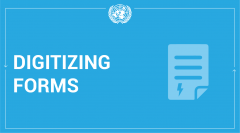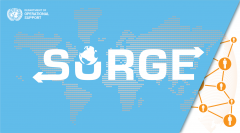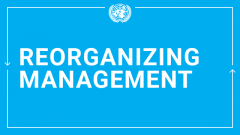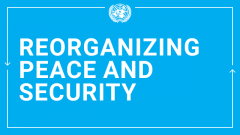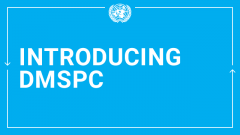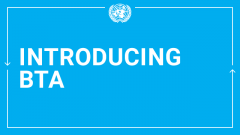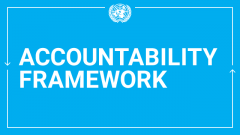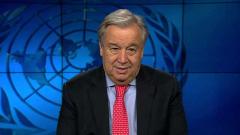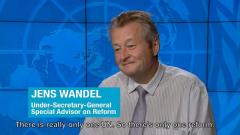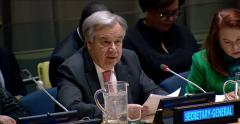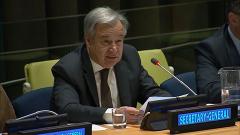On 2 October 2024 the Secretary-General signed the fourth iteration of the statement on internal control for all operations of the Secretariat for 2023.
News
Impact Stories
On 26 June 2023 the Secretary-General signed the third iteration of the statement on internal control for all operations of the Secretariat for 2022.
On 28 June 2022 the Secretary-General signed the second iteration of the statement on internal control for all operations of the Secretariat for 2021, a year after the first ever statement was published.
The Secretary-General has signed the first statement on internal control for all operations of the Secretariat for 2020, marking an important milestone towards achieving greater accountability for results. The statement on internal control is a public accountability document that provides reasonable assurance that the Secretariat operated under an effective system of internal control during 2020.
The global human resources strategy of 2019-21 set a goal to become “simplified, decentralized, flexible, and field-oriented” in order to drive strategic human resources management and empower managers.
Then COVID-19 exposed an overreliance on physical paperwork and signatures in our human resource management. Adopting electronic signatures and migrating paper-based forms into digital systems will help the United Nations strengthen its ability to manage human resources in an ever-changing world.
It might seem like critical situations or incidents should be second nature in the United Nations, yet sometimes capacities are stretched beyond any norm or barriers to reallocation of resources put up obstacles. As part of management reform, a dedicated capacity in the Department of Operational Support was created to support the start-up, surge, or closure of Secretariat entities, as well as to better respond to critical incidents.
- 1 of 2
- next ›
Reform News
On 2 October 2024 the Secretary-General signed the fourth iteration of the statement on internal control for all operations of the Secretariat for 2023.
The vision for management reform is to improve programme delivery by aligning responsibility for mandate implementation with the authority to manage resources, simplifying the administrative policy framework of the Secretariat, and moving decision-making closer to the point of delivery.
The Department of Political and Peacebuilding Affairs (DPPA) and the Department of Peace Operations (DPO) now jointly oversee eight new regional divisions, each managing a mix of peacekeeping operations, special political missions and non-mission settings.
The launch of the new Department of Management Strategy, Policy and Compliance (DMSPC) on 1 January 2019 was a critical step in the path to make the Secretary‑General’s vision for a nimbler, more responsive United Nations a reality.
Business Transformation and Accountability (BTA)—a critical pillar of the Department of Management Strategy, Policy and Compliance (DMSPC)—is a shining example of innovative transformation afforded by the new management paradigm.
Built on the principles of results-based management, an accountability framework will enable heads of entity to demonstrate that they are exercising their delegated authority in a transparent, responsible and accountable manner.
- 1 of 3
- next ›
Video
United Nations Secretary-General António Guterres emphasizes how the reforms will transform the work of the United Nations. “The aims of reform are clear: To focus more on people and less on process. To become more nimble and effective. And to build a workplace of equality, diversity and integrity."
24 Oct 2018 - In this brief interview, Special Adviser to the UN Secretary-General on Reforms, Mr. Jens Wandel of Denmark, introduces the three UN reform streams (Development, Management, and Peace and Security) as one “United to Reform” effort, all aimed at transforming the UN into a more effective, nimble and fit for purpose Organization, which can better serve its beneficiaries around the globe.
United Nations Secretary-General’s Informal Briefing to the General Assembly on the Implementation of the United Nations Reform.
The UN MEDEVAC Mechanism serves as an example of a successful One UN partnership between numerous entities to design, resource, and implement a system-wide medical evacuation framework in the face of the unprecedented circumstances of the COVID-19 pandemic. Complementing First Line of Defense (FLOD) activities, COVID-19 MEDEVAC is a last resort, which provides life-saving support for severely ill COVID-19 patients who require a level of care not available at their location. This ensures that UN personnel, partners, and their dependents can continue to stay and deliver.
In the face of mounting unrest in Burkina Faso, the United Nations System is mobilized to respond to security challenges using a wide range of tools in support of government. UN Resident Coordinator in Burkina Faso, Ms. Metsi Makhetha, explains how prevention is a key element of the reform.
The United Nations General Assembly has adopted an ambitious and comprehensive transformation of the UN development system. This is the first of a series of reform initiatives being put forward by Secretary-General António Guterres to make the UN fit for purpose in a changing world.


